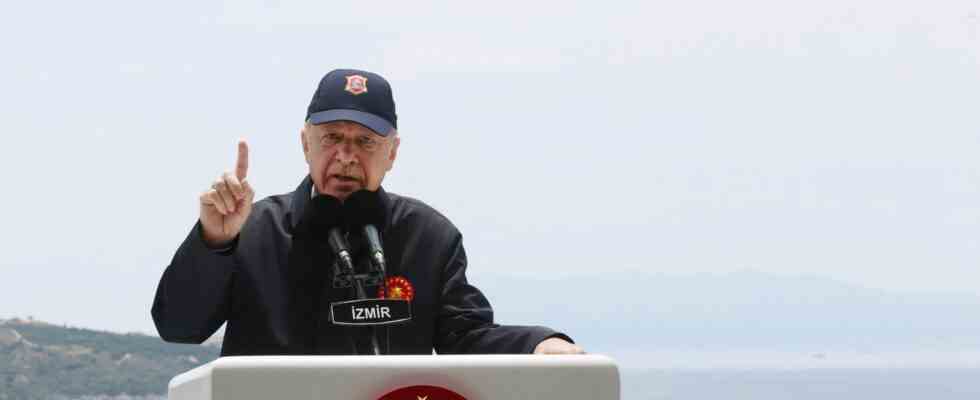Status: 06/14/2022 04:15 a.m
Turkish President Erdogan is demanding the demilitarization of several Greek islands and is blatantly threatening war. Many Greeks fear that threats will not stop there.
The Turkish-Greek border is being discussed in a Turkish television show broadcast by the pro-government private broadcaster Haber Turk. A map of the two countries can be seen on the screen in the background. One of the studio guests, the journalist Gürkan Zengin, stands in front of it, holding a pointer in his hand.
Zengin wields the baton at the western tip of mainland Turkey and draws a vertical line south – what he believes should be the actual border between Greece and Turkey. The consequence: several Greek islands such as the holiday islands of Rhodes and Kos would suddenly be Turkish territory.
This TV clip has spread like wildfire across social media in Greece over the past few days. Because what the journalist Zengin presented in a very populist way on television corresponds to what has been reproduced more and more frequently by high-ranking Turkish politicians in the past few days and weeks. The focus of the territorial dispute is primarily the Dodecanese group of islands, which also includes Rhodes, but also other inhabited islands such as Lesbos, Samos and Kos.
The Turkish-Greek border has actually been regulated for almost 100 years, but the question of sovereign rights in the East Aegean is complicated by international law: the Treaties of Lausanne (1923) and Paris (1947), for example, stipulate which islands are assigned to which country, but also that certain islands may not be militarized. In between, the Treaty of Montreaux (1936) came into being, which in turn was intended to partially replace the Treaty of Lausanne. Among other things, Turkey derives its disputed territorial claims from this treaty.
Embassy at military maneuvers
Last week, Turkish President Recep Tayyip Erdogan attended a major military maneuver in the western Turkish coastal city of Izmir, in which NATO allies were also involved. In his speech, he repeatedly accused Greece of arming a number of Aegean islands in violation of international law and warned Athens against further militarization.
Athens should “avoid dreams, statements and actions that it regrets”. Such actions could have “catastrophic consequences” and: “I’m not kidding.” Erdogan then had these statements distributed in writing in English and Greek via his Twitter channel.
Calm but alert
In Greece, this is taken as a clear threat of war. However, the government has so far reacted calmly: Greek Foreign Minister Nikos Dendias said at the summit meeting of Southeast European countries in Thessaloniki that they would not contribute to the escalation with neighboring Turkey by participating in insulting statements, illegal and inappropriate demands and accusations.
The Greek Foreign Ministry also published 16 maps intended to document “the extent of Turkish revisionism.” They are intended to show Turkish territorial claims from 1923 to the present day.
Clear feedback to the other side: Greece’s Foreign Minister Dendias, here in conversation with your Turkish counterpart Cavusoglu
Image: AFP
Don’t demilitarize right now
In view of the threatening gestures from the east, Athens also sees itself confirmed in not demilitarizing the islands in the east Aegean. Greece is thus exercising its right to self-defense, after all there are numerous landing craft on the west coast of Turkey.
In addition, Turkish fighter jets are currently violating Greek airspace almost every day and even fly over large inhabited islands such as Rhodes, Samos and Kos.
Erdogan wants several Greek islands to be demilitarized – he is also emphasizing the demand with military exercises.
Image: AP
A queasy feeling
That, and above all the verbal escalation, leaves many Greeks with a queasy feeling. Most hope that the Turkish president’s war rhetoric is merely part of his campaign strategy. Presidential elections are taking place in Turkey next year and Erdogan has announced that he wants to run again.
But the economic situation in Turkey is bad, with inflation at more than 70 percent according to official figures. So why not, as a distraction, rekindle a conflict that has been smoldering for decades?
No one really dares to predict how far Erdogan will go. However, the Greeks still remember the late summer of 2020 well, when Turkish and Greek warships faced each other in the eastern Mediterranean.

